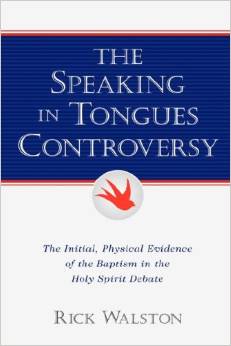The Speaking in Tongues Controversy: A Narrative-Critical Response, Part 2
Differing with Walston, classical Pentecostal Robert Graves writes that the doctrine of initial evidence and the subsequence of the baptism in the Holy Spirit are taught by scripture.
 Rick Walston, The Speaking in Tongues Controversy: The Initial, Physical Evidence of the Baptism in the Holy Spirit (Fairfax, VA: Xulon Press, 2003), 235 pages.
Rick Walston, The Speaking in Tongues Controversy: The Initial, Physical Evidence of the Baptism in the Holy Spirit (Fairfax, VA: Xulon Press, 2003), 235 pages.
Continued from Pneuma Review Fall 2005
Authorial Intent—the Doom of Pentecostal Theology?
For Walston, “Of all the arguments opposing the initial, physical evidence of the baptism in the Holy Spirit, that of authorial intent is, without a doubt, the most convincing …” (59). His methodology for proving this entails asking what he calls a “Guiding Question” of each incident where Luke describes someone experiencing salvation, “What importance does Luke give to tongues as evidence of the baptism in the Holy Spirit?” (pp. 61, 71). He then claims that there are twenty-six references in Acts of people being baptized in the Holy Spirit (126).17 Walston continues, “If Luke mentions the outward manifestation of tongues on only three of twenty-six soteriological occasions, with the number of people demonstrating this outward manifestation to be around 150 out of well over three thousand people, then the obvious question must follow, How important could it have possibly been to Luke?” (110). Thus, he reasons concerning the Jerusalem Pentecost and Acts 2:41, “It cannot be logically nor exegetically argued that all Christians who are baptized in the Holy Spirit should speak in tongues from a small sampling of only 120 out of 3,120 people” (126). “If it were as important an issue as Classical Pentecostals say it is, Luke would have used this three-thousand-person example to develop the concept. But, he does not” (71).
Throughout his chapter on authorial intent, Walston mentions a number of places where Luke, if he had wished to show that speaking in tongues is the initial, physical evidence of the baptism in the Holy Spirit, could have done so explicitly, and with great effect (e.g., the three thousand in 2:41, the Samaritans, the priests in 6:7, and Paul), but Luke is silent. Even if all of these believers did speak in tongues, the fact that Luke does not mention it is proof that tongues are not that important to Luke; thus, it was not Luke’s “intent to convey tongues as the initial, physical evidence of the baptism in the Holy Spirit” (73).
Just as Walston uses Acts 2:38-41 as the locus classicus to prove that to be saved is to be baptized in the Holy Spirit and vice versa, he also uses this passage as the locus classicus to prove that it is not Luke’s intent to teach that tongues are the normative, initial evidence of the baptism in the Holy Spirit. After repeating his Guiding Question, he writes, “The issue is not, ‘Did the three thousand speak in tongues?’ The issue is, ‘Why does Luke not make a point of saying that they did (or did not) speak in tongues?’ He does not mention it because it is not an issue. What Luke does take the time and space to describe is the soteriological outcome on this unique day” (71). Walston calls the incident with the three thousand a “paradigmatic gold mine” had Luke wanted to establish tongues as the evidence of Spirit-baptism (72).
Category: Spirit, Winter 2006


